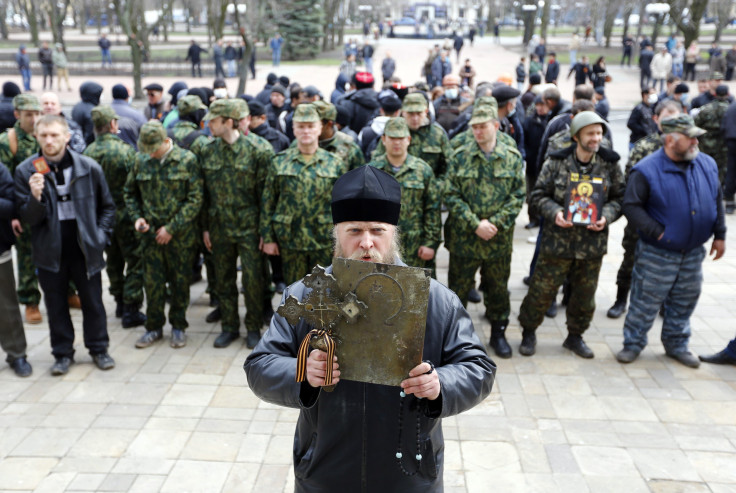Obama And Putin Talk About Ukraine On Phone With No Progress; EU Decides To Expand Sanctions On Russia

Update as of 03:51 a.m. EDT: Ukraine's interim President Oleksandr Turchynov said Tuesday that an “anti-terrorist” operation has begun in northern Donetsk, which has been seeing protests from pro-Russian separatist groups who have seized government buildings across various cities in the country.
"An anti-terrorist operation has begun today in the northern part of Donetsk region. It will be conducted step by step, responsibly, carefully," Turchynov said at a meeting, according to Ukrinform, a local news agency.
Dmytro Tymchuk, the head the Center for Military and Political Studies, said that the main focus of the operation was to avoid civilian casualties, but in a case where hundreds are involved, “such guarantees cannot be given," he said, Ukrinform reported.
U.S. President Barack Obama spoke to Russian President Vladimir Putin on Monday and asked him to urge anti-government protesters in Ukraine to back down, and warned him of further consequences if Russia continued to incite unrest in Ukraine.
Both leaders discussed the Ukrainian crisis, stressing on the situation in various cities across Ukraine, which are currently witnessing protests and violence from pro-Moscow supporters who have taken over government buildings and are clashing with local authorities. Meanwhile, the European Union, or EU, agreed to expand further sanctions against Russia on Monday even as the Ukrainian government, which had warned anti-government protesters that it would react with force if they did not surrender by Monday, had not taken any action against the separatist movement after the deadline.
"The President emphasized that all irregular forces in the country need to lay down their arms, and he urged President Putin to use his influence with these armed, pro-Russian groups to convince them to depart the buildings they have seized," the White House reportedly said in a statement, describing Obama’s call with Putin, which is the second such dialogue between the two leaders on the crisis in Ukraine after March 28, according to Associated Press, or AP.
Meanwhile, the Kremlin, in a statement, which claimed that reports of Russia’s intervention in Ukraine are based on unreliable information, said: “The protests in Donetsk, Lugansk, Kharkov, Slavyansk and other cities in southeastern Ukraine are the result of the Kiev authorities’ unwillingness and inability to take into account the interests of the Russian and Russian-speaking population”
Obama, who also spoke with President Francois Hollande of France on Monday, agreed with the French leader that “Russia will face significant additional costs if it continues this behavior,” the White House said in a statement.
“We shall be prepared to discuss ways of promoting a solution of the Ukrainian issue. But if the authorities in Kiev dare use force, our entire cooperation on the Ukrainian issue, on Ukrainian settlement will be undermined. We have let this known to our Western partners,” Russia's Foreign Minister Sergei Lavrov said, according to ITAR-TASS, a Russian news agency.
Ukraine's foreign ministry said that it will present relevant testimony and evidence to the international community at a meeting in Geneva on April 17, which is expected to be attended by the U.S., EU, Russia and Ukraine.
Ukraine’s interior ministry said on its website that pro-Russian protesters have seized local government buildings in Horlivka, Kramatorsk, Donetsk and Mariupol, on Monday, while the country's foreign ministry said that it had proof that “Russian special services and saboteurs have began the transition to large-scale separatist operations to seize power, destabilize the situation with the threat to the lives of citizens of Ukraine, as well as the separation of the eastern regions of our country.”
© Copyright IBTimes 2025. All rights reserved.






















